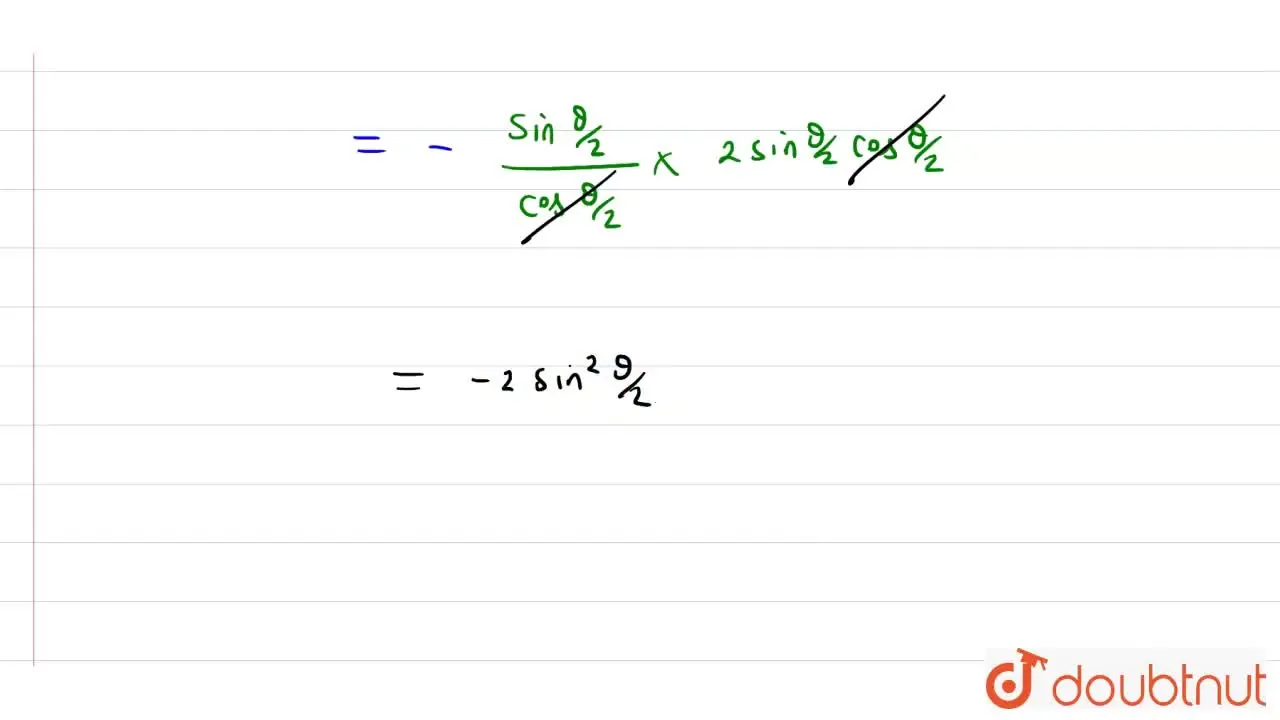If z is a complex number of unit modulus and argument θ, then the real part of z(1−¯z)¯z(1+z), is
2cos2(θ2)
1−cos(θ2)
1+sin(π2)
−2sin2(θ2)
The correct Answer is:D
We have, |z|=1, So let z=cosθ+isinθ and so ¯z=cosθ−isinθ.
∴z(1−¯z)¯z(1+z)=z−|z|2¯z+1=(cosθ−1)+isinθ(cosθ+1)−isinθ
=−2sin2θ2+2isinθ2cosθ22cos2θ2−2isinθ2cosθ2
=(2isinθ/2)(cosθ/2+isinθ/22cosθ/2(cosθ/2−isinθ/2))
=itanθ2(cosθ+isinθ)
∴ Real part of z(1−¯z)¯z(1+z)=−tanθ2sinθ=−2sin2θ2
Related Playlists
- BOOK - OBJECTIVE RD SHARMACHAPTER - COMPLEX NUMBERS EXERCISE - Section I - Solved Mcqs141videos
COMPLEX NUMBERS
- BOOK - OBJECTIVE RD SHARMACHAPTER - COMPLEX NUMBERS EXERCISE - Section II - Assertion Reason Type15videos
COMPLEX NUMBERS
- BOOK - OBJECTIVE RD SHARMACHAPTER - CIRCLESEXERCISE - Chapter Test55videos
CIRCLES
- BOOK - OBJECTIVE RD SHARMACHAPTER - CONTINUITY AND DIFFERENTIABILITYEXERCISE - Exercise86videos
CONTINUITY AND DIFFERENTIABILITY
Similar Questions
If z is a complex number of unit modulus and argument θ then arg (1+z1−¯z)=
View SolutionIf z is a complex number of unit modulus and argument θ, then arg(1+z1+¯z) equals to
View SolutionIf z is a complex number of unit modulus and argument θ, then arg(1+z1−¯z) is equal to
View SolutionIf z is a complex number of unit modulus and argument q, then arg(1+z1+¯z) equal (1) π2−θ (2) θ (3) π−θ (4) −θ
View SolutionIfa complex number z has modulus 1 and argument π3, then z2+z
View SolutionFind the complex number z if z2+¯z=0
View SolutionIf z is a complex number and all ai 's and bi 's are real numbers, then
Δ=∣∣ ∣∣a1z+b1¯za2z+b2¯za3z+b3¯zb1z+a1¯zb2z+a2¯zb3z+a3¯zb1z+a1b2z+a2b3z+a3∣∣ ∣∣=View SolutionIf z is a complex number such that amp (z-22z+3i)=0 and z0=3+4i, then the value of z0z+¯z0¯z (whenever defined)
View SolutionFind the complex number z if z¯z=2andz+¯z=2
View SolutionLet z be a complex number having argument greater than 0 but less than 'pi/2' and satisfying equation (z−5i)(¯z+5i)=25 then cotθ−10z is equal to
View Solution


